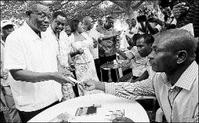GHANA - Presidential run-off vote goes smoothly in Ghana
Published: Monday | December 29, 2008

Presidential candidate and leader of the National Democratic Congress John Atta Mills receives his ballot from a polling agent as he prepares to vote during presidential elections in Accra, Ghana, yesterday. Ghanaians returned to the polls Sunday for a presidential run-off vote with Nana Akufo-Addo of the ruling party facing opposition candidate John Atta Mills in an election expected to further solidify the country's status as one of Africa's few stable democracies. - AP
ACCRA, Ghana (AP):
Ghana's presidential run-off vote appeared to go smoothly yesterday, obser-vers and analysts said, even though the West African nation's ruling party and opposition traded allegations of rigging.
Nana Akufo-Addo of the ruling party faced opposition candidate John Atta Mills, whose campaign maintains that the West African nation's economic growth has not been felt in people's wallets.
"On the whole, the election has been peaceful, with just some queues at some of the polling stations too long and too slow," said Kwesi Jonah, a scholar-in-residence at the Institute of Democratic Governance, an independent think tank.
Legitimately elected
President John Kufuor is stepping down after two terms in office in what is expected to be Ghana's second successful handover of power from one legitimately elected leader to another.
Observers with The Carter Center, founded by former United States (US) President Jimmy Carter, have said the first-round December 7 vote was exemplary. Ghana is one of Africa's few stable democracies. Neither candidate, though, secured enough votes to win the election outright.
The opposition alleged that 33 of its polling agents had been arrested in the Ashanti region, a perceived ruling party stronghold, during Sunday's run-off.
"It would therefore be difficult for us to accept the figures from the region and, consequently, the entire results of the elections," Alex Seghefia, campaign coordinator of the National Democratic Congress (NDC), told The Associated Press.
The ruling New Patriotic Party, however, rebutted the allegation, saying the Ashanti region was its stronghold and it would not do anything to put the results from that area in doubt.
"We have also had reports of people snatching ballot boxes in order to destroy voting and we know these are not our party supporters," ruling party spokesman Arthur Kennedy said.
Allegations
Deputy Minister for Information Frank Agyekum disputed the opposition's allegations and said "it is very disappointing and unfortunate the way the NDC was carrying on."
David Pottie with The Carter Center said ballot counting was under way Sunday night and that the group had been receiving partial preliminary reports from across the country. While the group had heard of "some irregularities in a few locations," Pottie said they had not received a large number of such reports.
"In a keenly contested election such as the one we have had, some of these accusations must be expected," said John Larvie, a senior programme officer at the Centre for Democracy and Development. "Some of the them were mere exaggeration but on the whole, it did not affect the electoral process as everything went well."
About five thousand security personnel were deployed across the country before Sunday's vote. During the first round, there was tension between supporters of the two main parties, and isolated cases of violence at polling stations in the country's interior.
Akufo-Addo received 49.13 per cent of that vote, while Atta Mills received 47.92 per cent.
Polling stations
In spite of initial slow numbers reported at various polling stations, Larvie said it appeared voter turnout was going to be higher than the first round.
"We voted the first time and there was no winner and so we need to come and vote again and that is why I am here this morning," said Michael Nkansah, 52, a cook in Accra who declined to say whom he voted for. "We all need a peaceful election."
Ghana, a rare example of democracy in a region of totalitarian states, suffered back-to-back coups in the 1970s and 1980s.
But after ruling for 11 years, strongman Jerry Rawlings organised elections. He won two terms, then surprised the world by ceding power when his party's candidate lost to Kufuor in the 2000 vote.
For Ghanaians, it's important that the election goes off without ballot stuffing and violence that continues to plague African elections. Ever since 1957, when it became the first nation in Africa to declare independence from its colonial ruler, Ghana has had the weight of history on its shoulders.
State purse
Ghana has seen over six per cent growth since Akufo-Addo's party took office eight years ago. Investment has grown twentyfold and the discovery of oil off the country's coast last year is expected to start pumping between $2 and $3 billion annually into the state purse within the next two years.
Yet, many say there is little to show for all the statistics indicating success. Ghana remains one of the world's poorest countries. One in 10 adults is unemployed and 40 per cent of the population cannot read or write. The average citizen earns $3.80 a day and is dead at 59.
